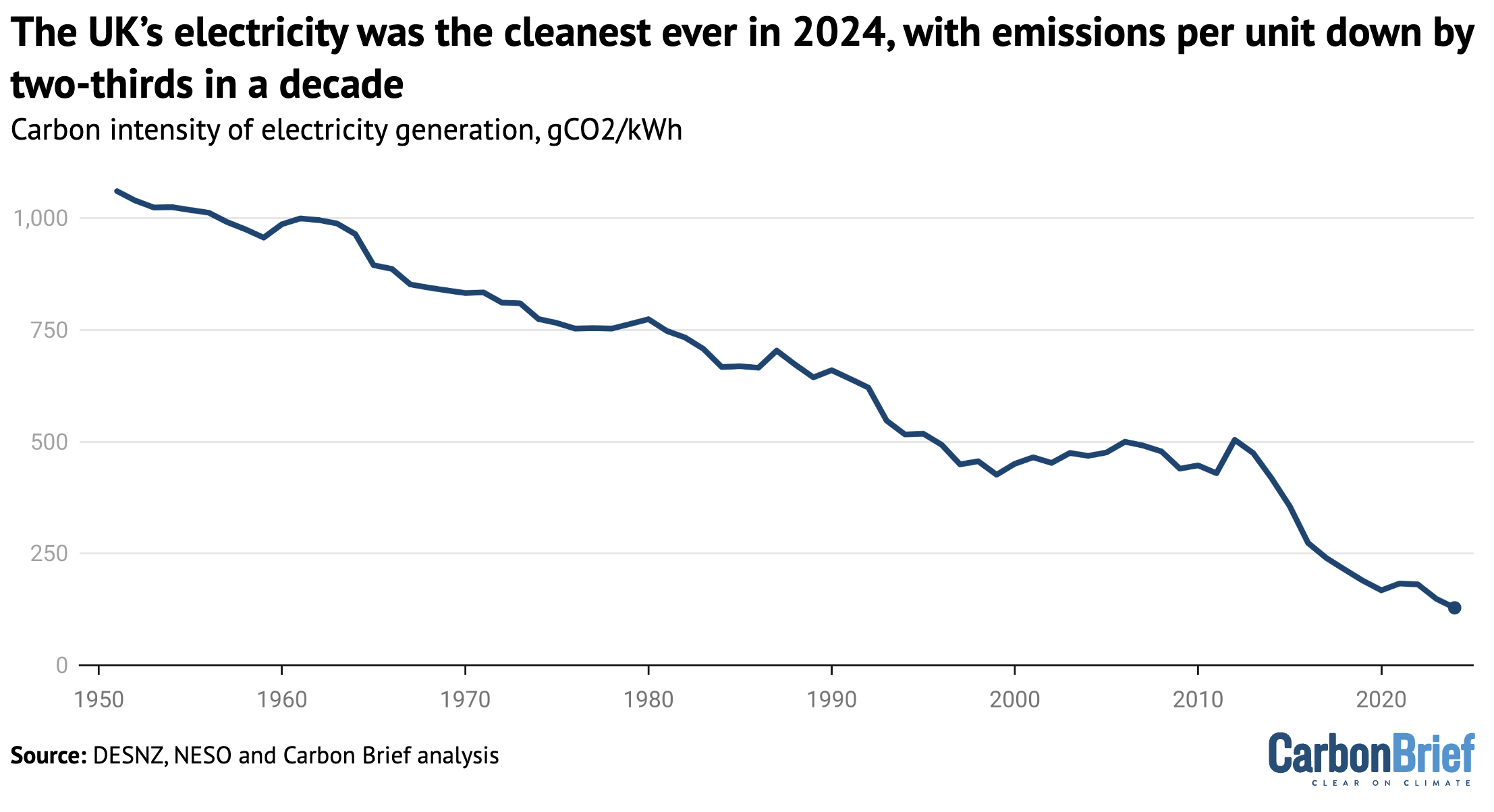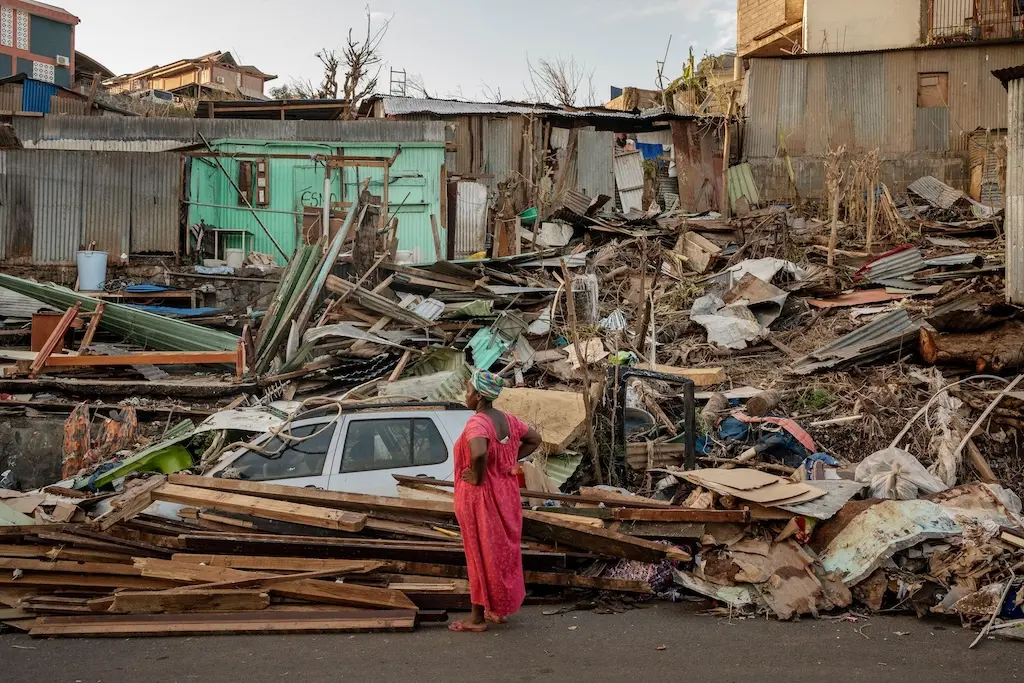
DeBriefed 3 January 2025: ‘Decade of deadly heat’; Russian gas cut off; Europe’s forgotten overseas territories and climate change
Josh Gabbatiss
01.03.25Josh Gabbatiss
03.01.2025 | 1:31pmWelcome to Carbon Brief’s DeBriefed.
An essential guide to the week’s key developments relating to climate change.
This week
Record heat in 2024
DEADLY DECADE: UN secretary general António Guterres used his new year’s message to declare that “we have just endured a decade of deadly heat”, the Press Association reported. The news outlet said that all of the top 10 hottest years on record took place in this period, with 2024 emerging as the hottest. Meanwhile, China Daily reported that China reached its hottest annual temperature since records began, while ABC News said Australia saw its second-warmest year.
DANGEROUS HEAT: The Associated Press covered research from World Weather Attribution and Climate Central that found people globally experienced “an average of 41 extra days of dangerous heat” last year due to climate change. The analysis also found that climate change intensified 26 of the 29 extreme weather events from last year that the groups studied, according to Euronews.
Turning off Russian gas
GAS BLOCK: Russian gas flowing into several European countries was stopped on New Year’s Day, after Ukraine refused to renegotiate a transit deal “in the hopes of hurting its invader financially”, NBC News reported. Ending the flow of gas via Ukrainian pipelines will cost the Russian state-backed Gazprom around $5bn a year in gas sales, but will also cost Ukraine around $800m a year in transit fees, according to CNN.
EUROPE’S RESPONSE: EU member states prepared for this event by increasing capacity for liquified natural gas (LNG) imports and renewables, according to the Kyiv Independent. LNG from the US and Qatar has also helped the EU move away from Russian gas, Reuters said. However, Euractiv reported on “unease” from negatively affected eastern European countries, with Slovakia “threatening” retaliation against Ukraine, and Moldova – which is not an EU member state – “declaring a state of emergency” amid gas shortages.
Around the world
- FIRE WEATHER: “Out of control” bushfires are blazing in Australia, with elevated fire danger warnings issued for many states amid high temperatures, according to the Guardian.
- FLOOD DAMAGE: Hundreds of people have been evacuated in north-west England due to flooding, BBC News reported. Meanwhile, the Bank of England warned that climate change-driven floods could “devastate the value” of hundreds of thousands of UK homes, according to the Daily Telegraph.
- BANK WITHDRAWAL: Morgan Stanley, Bank of America and Citigroup announced that they were quitting the UN-backed net-zero banking alliance, Bloomberg reported. Financial Times described the departures as “the latest sign corporate America may retreat from climate goals” under incoming president Donald Trump.
- ALL ELECTRIC: Norway is “on the brink” of achieving its target for 100% of new car sales to be electric by 2025, with zero-emission cars making up 88% of new sales last year, the National reported. Meanwhile, the Daily Telegraph said Tesla saw its “first ever drop” in annual electric-vehicle sales, amid pressure from Chinese rivals.
$75 billion
The amount that fossil-fuel companies will be fined over the next 25 years, under a recent New York state law, according to Reuters.
Latest climate research
- The record-long Canadian wildfire season in 2023 was more than five times as likely due to human-caused climate change, according to a new study published in npj Climate and Atmospheric Science.
- New research in Proceedings of the National Academy of Sciences concluded that the rate at which carbon dioxide (CO2) emissions increase could affect the pace at which the Atlantic Meridional Overturning Circulation (AMOC), a current moving water, heat and nutrients around the world, slows down.
- A nationally representative survey of more than 1,000 US adults, published in Environmental Science and Policy, found that only around one-third were aware of the term “climate justice”, but half supported its goals after reading a short description.
(For more, see Carbon Brief’s in-depth daily summaries of the top climate news stories on Thursday and Friday.)
Captured

The UK’s electricity was the cleanest it has ever been in 2024, according to new Carbon Brief analysis that was covered by the Times, the Guardian and other news outlets. CO2 emissions per unit have fallen by 70% over the past decade, as the chart above shows. This trend can be attributed to the UK phasing out coal while expanding its use of renewables, which reached a record 45% of electricity generation last year.
Spotlight
Europe’s forgotten overseas territories and climate change
In the wake of Cyclone Chido, Carbon Brief considers the climate threat facing Europe’s overseas territories.
Cyclone Chido tore through the French island of Mayotte in mid-December, killing at least 39 people and leaving thousands injured or homeless.
The storm, which was made more intense by climate change, was the strongest to hit the tiny Indian Ocean territory in close to a century. Much of the devastation was linked to the lack of sufficient shelter and resources in what has long been France’s poorest region.
Chido marks the latest extreme weather event to hit one of Europe’s “overseas territories” – colonial remnants that are largely dotted around the tropics, from the Caribbean to the Pacific.
‘Urgent action’ required
Most of the 34 European overseas territories are part of France, the UK and the Netherlands, due to their histories operating slave plantations on tropical islands.
These territories vary significantly in governance, wealth and independence. However, they have a shared vulnerability to climate-related threats, such as cyclones and sea level rise.
The EU’s first climate risk assessment report, published last year, called for “urgent action” to protect member states’ overseas territories from climate change, highlighting their “remote locations, weaker infrastructure and economic vulnerability”. UK territories, particularly those in the Caribbean, face similar challenges.
“Technically, politically, institutionally, they’re in the global north, but their realities are akin to any other country in the global south,” Dr Vanessa Deane, an urban planning researcher at New York University, told Carbon Brief.
Carbon Brief analysis of the Emergency Events Database (EM-DAT), run by the Centre for Research on the Epidemiology of Disasters (CRED) in Belgium, shows that at least 197 people in European overseas territories were killed by extreme weather events over 1990-2024. (EM-DAT is the most comprehensive disaster database, but lacks complete data for poorer countries, meaning this figure is likely to be an underestimate.)
At least another 39 have been killed by Chido in Mayotte, making it the deadliest single event over this period in an overseas territory, according to EM-DAT data. The final death toll may be far higher.
Another quarter of a million people in these territories have lost their homes, been injured or otherwise affected over this period, mainly due to cyclones, according to EM-DAT.

‘Lagging behind’
Dr Virginie Duvat, a small islands researcher at the University of La Rochelle in France, said territories such as Mayotte are simply not treated the same as their mainland counterparts by French policymakers:
“Climate adaptation policies are lagging behind. This is paradoxical because these territories are more exposed and more vulnerable to climate change.”
Elise Naccarato, a climate justice advocate at Oxfam France, pointed to the “almost total absence of the overseas territories” in France’s upcoming climate adaptation plan.
Overseas territories generally lack the financial and technical capacity to implement climate adaptation programmes, or recover from climate-related disasters. Yet they also often cannot access climate-related aid.
Instead, the territories tend to rely on specialised funds set up by the EU and central governments to support climate-related activities, but these have been described as “insufficient” and “uncertain”.
As an example, Dr Daphina Misiedjan, a legal researcher at Erasmus University in the Netherlands, pointed to the “roundabout way” that the Dutch government provided relief to the territory of Sint Maarten, in the wake of Hurricane Irma. Rather than providing money directly, the government handed control to the World Bank, and funds took years to reach people.
Last year, residents of the Dutch Caribbean island of Bonaire, alongside Greenpeace Netherlands, launched a lawsuit against the Netherlands, claiming the state had not protected them sufficiently from climate change.
“[European countries] really profited from the colonial times, but now they have extra responsibility to make sure these islands are safe during the climate crisis,” Greenpeace climate campaigner Maarten de Zeeuw told Carbon Brief.
Watch, read, listen
THE YEAR IN CLIMATE: After a year of key elections and many extreme weather events, BBC podcast the Climate Question presented a review of the top climate stories from 2024, hosted by an expert panel.
WINE LIST: A “big read” article in the Financial Times, which includes interactive graphics, looked at how the changing climate is pushing wine making into northern regions and “redrawing of Europe’s wine map”.
BEST BOOKS: Mongabay has published a list of 10 “notable” environment-themed books published in 2024. Topics covered range from Indigenous land rights to coral bleaching.
Coming up
- 6-11 January: First Global Heat Health Information Network Southeast Asia Heat Health Forum, Singapore
- 9-10 January: Attribution Science and Climate Law Conference, New York City
- 9-11 January: Extraordinary Summit on the Post Malabo Comprehensive Africa Agriculture Development Programme, Kampala, Uganda
Pick of the jobs
- UK Climate Change Committee, chair | Salary: £1,000 per day. Location: London
- Wiley, deputy editor – environment | Salary: $59,900-$87,767. Location: Remote or hybrid, US, UK or Brazil
- Smith School, University of Oxford, data lead – state of carbon dioxide removal | Salary: £48,235-£57,255. Location: Oxford, UK
DeBriefed is edited by Daisy Dunne. Please send any tips or feedback to [email protected].
This is an online version of Carbon Brief’s weekly DeBriefed email newsletter. Subscribe for free here.
-
DeBriefed 3 January 2025: ‘Decade of deadly heat’; Russian gas cut off; Europe’s forgotten overseas territories and climate change


